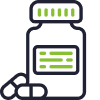The 2x Referral Bonus Event Is Now On! More Info ➡️
Home » Medication » Adlyxin (Lixisenatide) 100 mcg/ml
SAVE 10% OFF First Order With Coupon Code: WELCOME10
The 2x Referral Bonus Event Is Now On! More Info ➡️
Home » Medication » Adlyxin (Lixisenatide) 100 mcg/ml
SAVE 10% OFF First Order With Coupon Code: WELCOME10
Our Price: $200.00

4-10 Day US Delivery
Brand Name Product
Step 1
Place Your Prescribed Adlyxin Dosage In Your Cart
Step 2
Complete Checkout
Step 3
Upload Your Adlyxin Prescription
(Shipping takes approximately 4-10 business days. A tracking number will be provided)

Adlyxin carries a risk of severe allergic reactions, including anaphylaxis and angioedema. Patients should be monitored for signs of hypersensitivity reactions and instructed to seek immediate medical attention if symptoms occur. The medication should not be used in patients with a history of hypersensitivity to any of its components.

You should not use Adlyxin if you are allergic to lixisenatide or have diabetic ketoacidosis (call your doctor for treatment).
To make sure Adlyxin is safe for you, please notify your doctor if you have pancreatitis or gallstones, problems with digestion, alcoholism, or kidney disease.
Tell your doctor if you are pregnant or breastfeeding.
Follow your doctor’s instructions about using this medicine if you are pregnant or you become pregnant. Controlling diabetes is very important during pregnancy, and having high blood sugar may cause complications in both the mother and the baby.
Adlyxin can make birth control pills less effective. If you take a birth control pill, take it at least 1 hour before or 11 hours after using Adlyxin.
Adlyxin is not approved for use by anyone younger than 18 years old.

Anaphylaxis and Serious Hypersensitivity Reactions
Lixisenatide-sensitive patients should not be treated with Adlyxin. The patient should stop taking Adlyxin immediately if they experience a hypersensitivity reaction.Patients treated with GLP-1 receptor agonists have experienced acute pancreatitis, including hemorrhagic or necrotizing pancreatitis. Clinical trials of Adlyxin observed 21 cases of pancreatitis in patients treated with Adlyxin and 14 cases in patients treated with the comparator (incidence rate of 21 vs. 17 per 10,000 patient-years). Adlyxin cases included acute pancreatitis (n=3), pancreatitis (n=12), chronic pancreatitis (n=5), and edematous pancreatitis (n=1). Some patients had risk factors for pancreatitis, such as cholelithiasis or alcoholism.
Never Share Adlyxin Pen Between Patients
Even if the needle is changed, Adlyxin pens should never be shared. Blood-borne pathogens can be transmitted through pen-sharing.
Hypoglycemia with Concomitant Use of Insulin Secretagogues or Insulin
Hypoglycemia may be reduced by reducing the dose of sulfonylurea (or other concomitantly administered insulin secretagogues) or insulin. Educate patients about hypoglycemia and the signs and symptoms of hypoglycemia if they are taking these concomitant medications.Chronic renal failure and acute kidney injury, which may sometimes require hemodialysis, have been reported post-marketing in patients treated with Adlyxin. In some cases, no underlying renal disease was known. Patients who suffered from nausea, vomiting, diarrhea, or dehydration reported most of the reported events.
Immunogenicity
Alternate antidiabetic therapies should be considered in the event of worsening glycemic control or failure to achieve targeted glycemic control, significant injection site reactions, or allergic reactions.
Following treatment with Adlyxin, patients may develop antibodies to lixisenatide. Among lixisenatide-treated patients, a pooled analysis showed that 70% were antibody positive at Week 24. The glycemic response was attenuated in the subset of patients (2.4 %) with the highest antibody concentration (>100 nmol/L). Antibody positive patients had a higher incidence of allergic reactions and injection site reactions.
Patients with renal impairment and patients who report severe gastrointestinal reactions should monitor renal function when initiating or escalating Adlyxin treatment. This medication should not be given to patients with end-stage renal disease.
Acute Kidney Injury
The risks of hypoglycemia, including severe hypoglycemia, are increased for patients who receive Adlyxin and basal insulin or insulin secretagogues (e.g., sulfonylurea). Patients receiving sulfonylurea with or without metformin reported 14.5% of symptomatic hypoglycemia on Adlyxin compared to 10.6% on placebo. 28.3% of patients taking Adlyxin reported symptomatic hypoglycemia compared to 23.0% of patients taking a placebo. In patients receiving basal insulin and sulfonylurea, 47.2% of patients on Adlyxin reported symptoms of hypoglycemia compared to 21.6% on placebo.

Use Adlyxin precisely as prescribed by your doctor.. Follow all directions on your prescription label and read all medication guides or instruction sheets.
Adlyxin is injected under the skin. A healthcare provider may teach you how to use the medication by yourself properly.
Adlyxin is usually injected once per day within 60 minutes (1 hour) before your first meal of the day. Try to use the medicine at the same time each day.
Read and carefully follow any Instructions for Use provided with your medicine. Ask your doctor or pharmacist if you don’t understand all instructions.
Prepare an injection only when you are ready to give it. Do not use if the medicine has changed colors or has particles in it. Call your pharmacist for new medicine.
Your healthcare provider will show you where on your body to inject Adlyxin. Use a different place each time you give an injection. Do not inject into the same place two times in a row.
Never share an injection pen, cartridge, or syringe with another person, even if the needle has been changed. Sharing these devices can allow infections or diseases to pass from one person to another.
Follow a proper diet (similar to Trulicity’s diet and Saxenda’s diet) and exercise regimen for the best results.


Adlyxin can cause serious side effects, such as inflammation of the pancreas (pancreatitis), which may be severe and lead to death. Stop using Adlyxin and call your healthcare provider right away if you have severe pain in your stomach area (abdomen) that will not go away, with or without vomiting. You may feel pain from your waist to your back.
Do not use Adlyxin if you are allergic to lixisenatide or any of the other ingredients in Adlyxin.
Symptoms of severe allergic reaction with Adlyxin may include swelling of your face, lips, tongue, or throat, problems breathing or swallowing, severe rash or itching, fainting or feeling dizzy, and very rapid heartbeat.
Your doctor may prescribe a glucagon injection kit in case you have severe hypoglycemia. Be sure your family or close friends know how to give you this injection in an emergency.

Adlyxin can slow your digestion, and it may take longer for your body to absorb any medicines you take by mouth.
-If you also take acetaminophen (Tylenol), take it at least 1 hour before using Adlyxin.
-If you also take an antibiotic, take it at least 1 hour before you use Adlyxin.
-If you also take a birth control pill, take it at least 1 hour before or 11 hours after using this medicine.
Other drugs may interact with lixisenatide, including prescription and over-the-counter medicines, vitamins, and herbal products. Tell your doctor about all your current medicines and any medicine you start or stop using.

Wait until your next meal and use the medicine within 1 hour before you eat. Then go back to your regular injection schedule the next day. Do not use two doses at one time.
If you overdose on Adlyxin please seek medical attention immediately, as this can lead to poisoning and death.

In patients with mild renal impairment no dose adjustment is required but close monitoring for Adlyxin related adverse reactions and for changes in renal function is recommended because a higher incidence of hypoglycemia, nausea and vomiting was observed in these patients.
In a cardiovascular outcome study, 655 (22%) lixisenatide treated patients had moderate renal impairment (eGFR: 30 to less than 60 mL/min/1.73 m2). Patients with moderate renal impairment do not require dosing adjustments, but close monitoring is recommended for adverse reactions related to Adlyxin, as these reactions may cause dehydration and acute kidney failure and worsen chronic renal failure.
Adlyxin has minimal clinical experience in patients with severe renal impairment as only 5 patients with severe renal impairment (eGFR less than 30 mL/min/1.73 m2) were exposed to it in all controlled studies. These patients had higher levels of lixisenatide exposure. Adlyxin should be carefully monitored for gastrointestinal adverse reactions and alterations in renal function in patients with significant renal impairment.
Adlyxin has no therapeutic experience in patients with end-stage renal disease (eGFR 15 mL/min/1.73 m2), and it is not recommended for patients with this condition.

Animal studies have shown reproductive toxicity. Studies in pregnant rats and rabbits at doses of 1 and 6 times the recommended human dose, respectively, were associated with visceral closure and skeletal defects. There are no controlled data in human pregnancy.
In humans, poorly controlled diabetes during pregnancy increases the fetal risk for significant congenital disabilities, stillbirth, and macrosomia-related mortality.
AU TGA pregnancy category B3: Drugs that have been taken by only a limited number of pregnant women and women of childbearing age, without an increase in the frequency of malformation or other direct or indirect harmful effects on the human fetus having been observed. Studies in animals have shown evidence of an increased occurrence of fetal damage, the significance of which is considered uncertain in humans.
US FDA pregnancy category Not Assigned: The US FDA has amended the pregnancy labeling rule for prescription drug products to require labeling that includes a summary of risk, a discussion of the data supporting that summary, and relevant information to help health care providers make prescribing decisions and counsel women about the use of drugs during pregnancy.
There is insufficient available data in pregnant women to inform a drug-associated risk of significant congenital disabilities and miscarriage.
Adlyxin is not known to be present in human milk, nor are the effects of Adlyxin on the breastfed infant or milk production. Rat milk does contain lixisenatide. As well as breastfeeding’s developmental and health benefits, the mother’s clinical need for lixisenatide and the baby’s potential adverse effects from lixisenatide or from the maternal condition should be considered.
Storing unopened (not in use) Adlyxin: Refrigerate and protect from light. Take the injection pen out of the refrigerator and allow it to reach room temperature before using it.
Do not freeze, and throw away the medicine if it has been frozen.
Storing opened (in use) Adlyxin: Store at room temperature in the original package with the pen cap attached. Do not store with a needle attached.
The prefilled injection pen contains 14 pre-set doses for daily use. Throw the pen away after 14 days, even if there is still medicine left inside.

Put the cap back on your Adlyxin pen before throwing it away (getting rid of it). Immediately after use, dispose of the used Adlyxin pen in a sharps disposal container approved by the FDA. In your household trash, do not dispose of Adlyxin pens or loose needles. In the absence of an FDA-cleared sharps disposal container, you may use a household container that is: made of heavy-duty plastic, sealed with a tight-fitting, puncture-resistant lid, upright and stable during use, leak-resistant, and properly labeled to alert the user that the container contains hazardous waste.
If your sharps disposal container is almost full, you will need to follow your community’s guidelines for disposing of your sharps disposal container. Used needles and syringes may be disposed of according to state or local laws. Please visit the FDA’s website at: http://www.fda.gov/safesharpsdisposal for more information regarding safe sharps disposal.
Your used sharps disposal container should not be disposed of in your household trash unless your community guidelines allow it. Sharps disposal containers should not be recycled.

At Insulin Outlet, we ensure the safety and quality of our medications, meeting all federal legislation standards. Your order will be dispatched from a reputable licensed Canadian pharmacy, guaranteeing the highest standards of reliability and authenticity. This medication has been approved by Health Canada (Canada's FDA) and is identical to what you would receive in the US, only with Canadian labeling and packaging. We do not sell counterfeit or unauthorized medications. Our discounted medications are shipped directly from Canada to your doorstep, providing a fast and secure delivery experience. To conveniently buy Adlyxin online at a significant discount, place your order above or call us at 1-888-238-0872.
Related Products
Customer Service
Email: info@insulinoutlet.com
Fax: 1-888-804-1287
Hours Of Operations
Mon-Fri: 9AM – 11PM
Sat: 10AM – 4PM
Sun: 9AM – 3PM
Intellectual Property Rights: All logos, trademarks, and brand names displayed on insulinoutlet.com are the property of their respective owners. Insulinoutlet.com uses these logos and trademarks solely to identify the products we carry and to provide accurate information to our customers. The use of these logos does not imply endorsement or sponsorship by the respective owners. If you believe that any material on our site infringes your intellectual property rights, please contact us immediately at help@insulinoutlet.com so that we can address your concerns promptly.
Copyright © 2025 Insulin Outlet – All Rights Reserved







You can see how this popup was set up in our step-by-step guide: https://wppopupmaker.com/guides/auto-opening-announcement-popups/
We are experiencing a shortage of Ozempic pens. To be able to serve all our customers and to make sure all our customers do not miss their dose we are limiting purchases to 1 pen per order for 4mg pens.
This medication requires to be shipped cold. The cold shipments are closed for the holidays between December 19th, 2022 and January 3rd, 2023. You can place the order however your card will not be charged until the item is ready to be shipped.
Unfortunately, our supply has slowed down with the Ozempic 2mg/1.5ml pen (weekly doses of .25mg and/or .50mg). While we are still receiving shipments of these Ozempic pens, they are not at the same supply levels as before. There will be a slight delay in shipments as it could take up to 2 weeks for the orders to be shipped. We apologize for any inconvenience.
Due to potential shortages of Ozempic in Canada, we are following the recommendations from the Canadian Ministry of Health, and will not be able to take any new customers for the time being. We apologize for the inconvenience.
We can still process refills for existing customers.
Our team is working around the clock to find a solution to this current situation.
If you do have any questions or concerns, please do not hesitate to reach out to us.
We are experiencing a shortage of Ozempic pens. To be able to serve all our customers and to make sure all our customers do not miss their dose we are limiting purchases to 2 pens per order for Ozempic 2mg pens.
By checking this box, you are opting in to receive SMS (text) messages from us. We will send you text notifications, updates, and may engage in SMS conversations to provide support or gather necessary information for your account. Your mobile number will not be shared with third parties and will be used in accordance with our privacy policy. Message and data rates may apply. You can reply STOP anytime to opt-out of SMS communications at anytime.
[Pharmacy_login]
Cold Medication Shipments
Please be aware that cold-chain shipments, including products like Ozempic, Mounjaro, and Insulin, will not be available for delivery from December 20th through January 1st.
Dry Medication Shipments
For dry medication shipments, including pills and tablets, there will be a brief interruption in service from December 23rd through December 28th. During this period, we will not be able to process or ship these items.
We kindly request that you plan your medication needs accordingly to ensure you have an adequate supply during this short shipping pause.